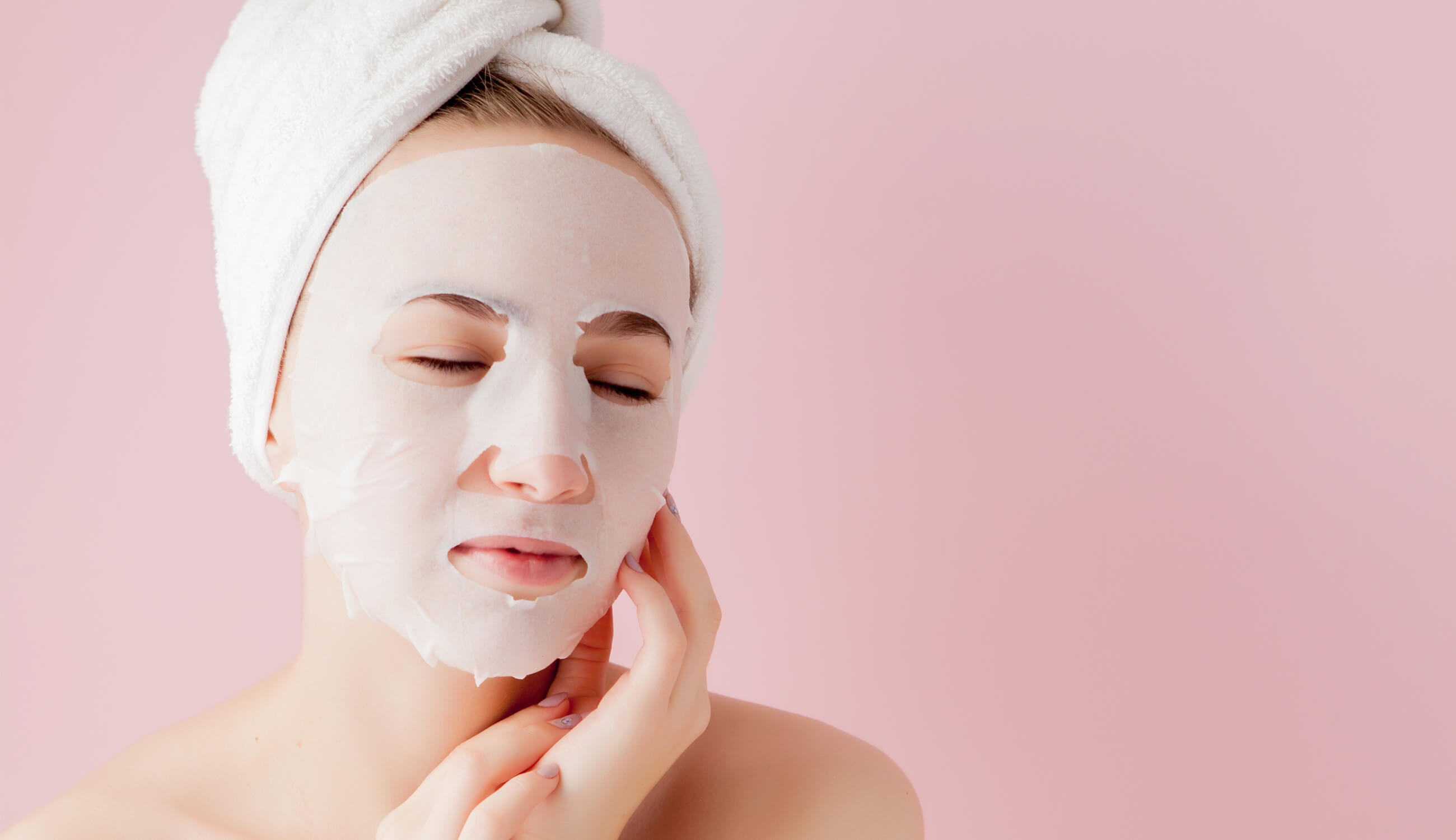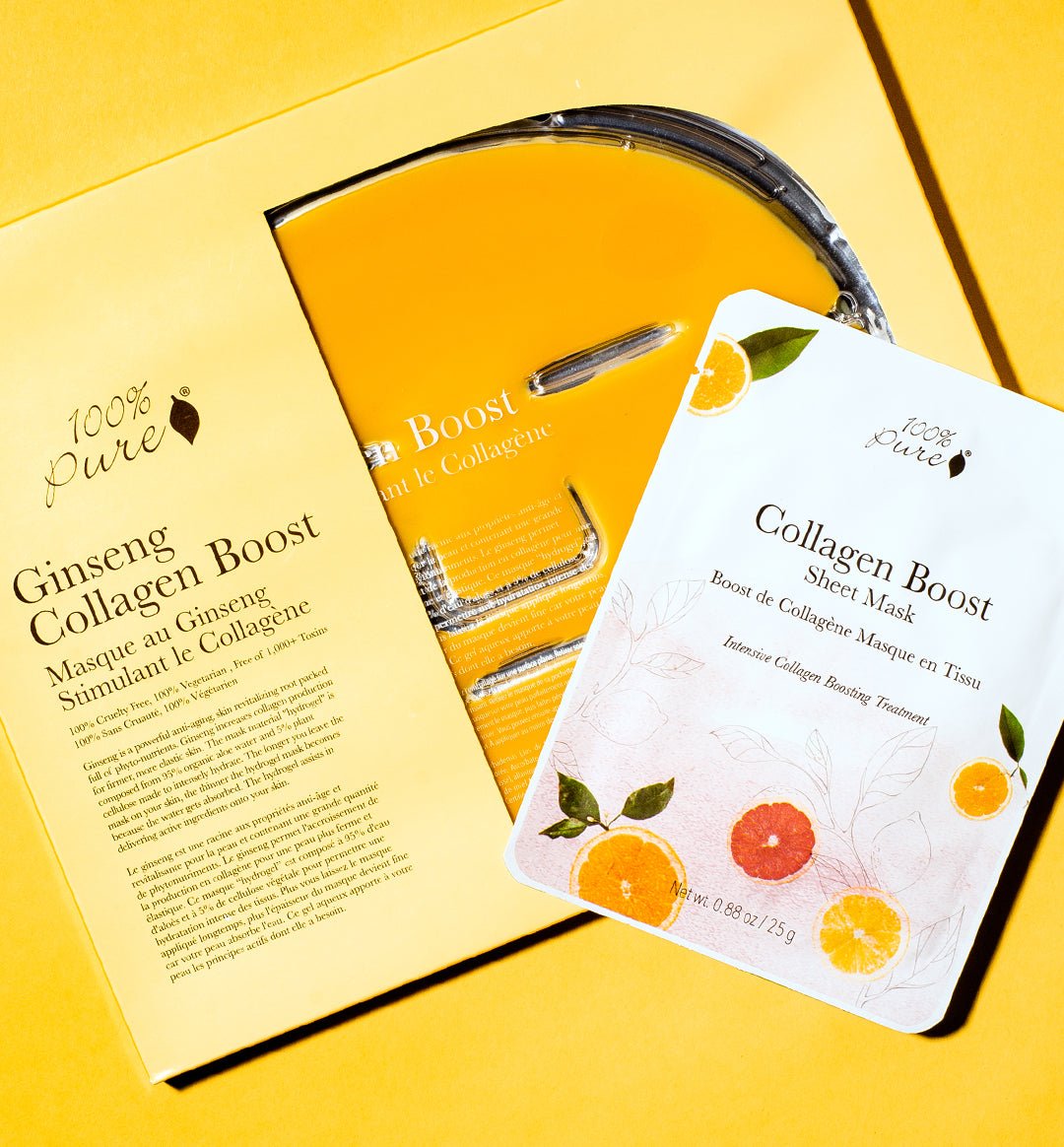In recent years, the mask-crazed beauty junkies of the world have elevated collagen to near cult status. Collagen face masks are touted as miracle-working, age-reversing, skin-brightening, inner-goddess super ingredients—or so say the beauty influencers. We’re here to weigh in on the debate, because here’s the real truth: not all collagen face masks are created equal!
The word collagen on the front of your mask (or an online influencer’s paid review) doesn’t mean a mask is worth the hype. What you need to do is look carefully at ingredient lists – especially when it comes to collagen products. Learn about the mandates behind the beauty brands you use, the ingredients they use, and most importantly, whether these things align with your conscious beauty priorities.
Collagen of Animal Origin… On your face!
The truth is, the majority of collagen face masks on the market will contain small amounts of animal-derived collagen (along with a bunch of other nasty ingredients). It’s not uncommon to find collagen combined with heavy silicones: a cheap filler known to clog pores and make your skin look dull and dehydrated.
Other offenders in collagen face masks include synthetic chemical preservatives, including carcinogen formaldehyde and hormone-disrupting parabens. These are usually combined with potentially carcinogenic synthetic fragrances, as well as other animal ingredients such as gelatin and snail slime (a current Korean beauty trend).
So while it may seem like you have a lot of options when it comes to choosing your face masks, the reality is that many formulas out there just aren’t skin-loving enough for you to spend your money on. That said, collagen has gained a cult following for a reason, and we’re certainly not here to tell you to avoid it – just certain types. Responsibly sourced and combined with healthy plant-based ingredients, collagen has serious potential to boost your daily beauty regimen.
What causes collagen loss?
As we age, our body’s natural production of collagen slows down. External factors such as UV exposure, pollution and poor skin care habits accelerate this loss, leading to sagging, wrinkling and dull skin. To combat this, skin care routines should focus not only on replenishing collagen but also on protecting existing collagen from breakdown.
One way to do this is through integration products rich in antioxidants in your routine. Products like Vitamin C boost from 100% PURE provide an extra dose of vitamin C, a critical nutrient for collagen synthesis. Mixing this powder with your favorite serum or moisturizer helps brighten skin while promoting collagen production.

Why are collagen face masks so popular?
With regular use, a high-quality collagen face mask can restore the structural integrity of your skin. By the age of forty, you lose about 15% of your natural collagen. This means your skin becomes less elastic and less dense, developing a sagging or sunken effect as you age. Supplementing your skin with extra collagen can help boost your skin’s collagen content. This means plumping up fine lines and wrinkles and restoring your skin’s structure and shape.
Masks are particularly useful collagen delivery systems because they cover the entire surface of your skin, facilitating absorption and minimizing evaporation. With frequent application, a high-quality collagen mask can prevent oxidative damage caused to your skin by UV rays and other external stressors such as pollution and topical use of toxic chemicals.
For even more intensive collagen boosting, try this Multivitamins + Antioxidants Powerful PM serum. This powerful night serum contains retinol and niacinamide, which promote skin cell renewal and stimulate collagen production. Regular use of this serum can help smooth fine lines and improve skin texture, making it an ideal addition to your anti-aging routine.

Why we use plant – not animal – sources of collagen
When it comes to choosing a type of collagen, rest assured that there are many non-animal methods to support your skin’s collagen stores. There are also powerful vegan ingredients that can promote collagen production. For example, products with plant-based retinol or green tea extract can help boost your skin’s natural collagen synthesis. An excellent choice is the EGCG Green Tea Concentrate Cream. This moisturizer is packed with antioxidants from green tea, which helps prevent collagen breakdown caused by free radicals. It also provides hydration and improves skin elasticity, making it an excellent choice for maintaining youthful skin.
Vegan collagen can be synthesized using modified yeast and bacteria, which is formulated with an enzyme called pepsin to help structure the formula into collagen molecules that mimic animal collagen. You can also find skin care products that contain plant-based silicon, which repairs damaged collagen and protects your skin cells from future damage.
However, it’s not necessary to go for the super expensive vegan alternatives when you can use plant-based collagen boosters that can naturally boost skin firmness and elasticity. One of the most important ingredients that can be used to promote collagen production is vitamin C, which works at the cellular level to activate the growth of new connective tissue and collagen precursor amino acids.
Without vitamin C, collagen cannot be synthesized by the body. This means that what may seem like a collagen deficiency could actually be a vitamin C deficiency. In addition, vitamin C is a powerful antioxidant that protects your skin from free radical damage, which is the number one cause of sagging of collagen. Vitamin C works alongside the anti-inflammatory ginseng in ours Ginseng royal jelly maskwhich works hard to reduce redness and pore size, as well as brighten and tighten your skin.
The newest collagen face mask is the ultra-concentrated one Collagen Strengthening Sheet Maskwhich combines vitamin C with vegetable retinol. Similar to vitamin C, retinol is an MVP that boosts collagen and increases the rate of skin cell renewal – it can stimulate collagen production and seriously improve the appearance of photoaged and mature skin.
Both of these cruelty-free, collagen-boosting mask formulas work to tighten your skin and smooth the early development of lines and wrinkles. Using 100% plant-based ingredients, both of these mask formulas work effectively to strengthen your skin’s cell matrix for an overall smoother, plumper complexion. Unlike many collagen face masks on the market today, they contain no potentially harmful synthetic fillers or hormone disruptors.
The role of antioxidants in supporting collagen production
While collagen masks help replenish the skin’s collagen levels, antioxidants play a key role in maintaining and enhancing this process. Antioxidants such as vitamin C, green tea and ginseng protect the skin from free radicals, which are one of the main causes of collagen breakdown. Incorporating antioxidant-rich products into your routine can help reduce oxidative stress, promote collagen synthesis, and maintain firmer, younger-looking skin.
Antioxidants also enhance the effectiveness of collagen masks by creating an optimal environment for collagen production. When used together, these ingredients work synergistically to boost skin resilience and fight early signs of aging.
Tips for enhancing collagen absorption:
- Pair your collagen mask with a vitamin C serum for maximum collagen-boosting benefits.
- Follow up with a moisturizer that contains antioxidants that lock in hydration and protect the skin.
- Use collagen masks consistently, 2-3 times a week, for long-term results.
Are you intrigued by the mystery of collagen? You can also look for skin care products or supplements that contain copper, which is an essential building block for collagen production. You can also get copper from high quality dark chocolate – so go ahead and cut a square! Stay tuned here for more ingredient stories, guides and more!
Frequently asked questions about collagen face masks
1. How often should I use a collagen face mask?
It is generally recommended to use a collagen face mask 2-3 times a week. Regular use helps maintain hydration, boost collagen levels and improve overall skin texture.
2. Can collagen face masks help with fine lines and wrinkles?
Yes, collagen face masks can help reduce the appearance of fine lines and wrinkles. They work by providing hydration and promoting collagen production, which improves skin elasticity and smooths the signs of aging over time.
3. Are plant-based collagen masks as effective as animal-based collagen masks?
Absolutely! Plant-based collagen masks can be just as effective, especially when combined with ingredients like vitamin C and retinol, which boost collagen production naturally. They also avoid the potential irritants found in animal-derived collagen masks.
4. Can I use a collagen face mask if I have sensitive skin?
Yes, many collagen face masks are designed to be gentle on the skin. However, it is essential to check the ingredients list and choose masks that do not contain harsh chemicals and synthetic fragrances. Always perform a patch test before using a new product.
5. Do I need to moisturize after using a collagen face mask?
Yes, applying a moisturizer after using a collagen face mask is essential. It helps seal in the benefits of the mask and provides an extra layer of hydration and protection for your skin.
